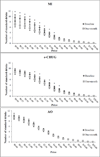Behavioral economic predictors of brief alcohol intervention outcomes
- PMID: 26167945
- PMCID: PMC4658255
- DOI: 10.1037/ccp0000032
Behavioral economic predictors of brief alcohol intervention outcomes
Abstract
Objective: The present study attempted to determine whether behavioral economic indices of elevated alcohol reward value, measured before and immediately after a brief alcohol intervention, predict treatment response.
Method: Participants were 133 heavy drinking college students (49.6% female, 51.4% male; 64.3% Caucasian, 29.5% African American) who were randomized to 1 of 3 conditions: motivational interviewing plus personalized feedback (brief motivational interventions; BMI), computerized personalized feedback intervention (electronic check-up to go; e-CHUG), and assessment only.
Results: Baseline level of alcohol demand intensity (maximum consumption) significantly predicted drinks per week and alcohol problems at 1-month follow-up and baseline relative discretionary expenditures on alcohol significantly predicted drinks per week and alcohol problems at 6-month follow-up. BMI and e-CHUG were associated with an immediate postsession reduction in alcohol demand (p < .001, ηp2 = .29) that persisted at the 1-month follow-up, with greater postsession reductions in the BMI condition (p = .02, ηp2 = .06). Reductions in demand intensity and Omax (maximum expenditure) immediately postintervention significantly predicted drinking reductions at 1-month follow up (p = .04, ΔR2 = .02, and p = .01, ΔR2 = .03, respectively). Reductions in relative discretionary expenditures on alcohol at 1-month significantly predicted drinking (p = .002, ΔR2 = .06,) and alcohol problem (p < .001, ΔR2 = .13) reductions at the 6-month follow-up.
Conclusions: These results suggest that behavioral economic reward value indices may function as risk factors for poor intervention response and as clinically relevant markers of change in heavy drinkers.
(c) 2015 APA, all rights reserved).
Figures


References
-
- Bentzley BS, Jhou TC, Aston-Jones G. Economic demand predicts addiction-like behavior and therapeutic efficacy of oxytocin in the rat. Proceedings of the National Academy of Sciences. 2014 http://dx.doi.org/10.1073/pnas.1406324111. - DOI - PMC - PubMed
Publication types
MeSH terms
Grants and funding
LinkOut - more resources
Full Text Sources
Other Literature Sources
Medical

